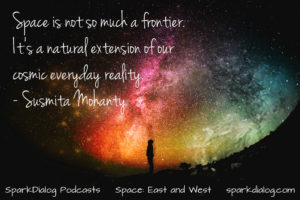Podcast: Play in new window | Download
Subscribe: Apple Podcasts | RSS | More
Culture affects many things within our lives – even how we approach considerable ventures such as space exploration. Today, we talk to Dr. Susmita Mohanty about how the philosophical underpinnings and culture within India’s space program lead to a differing mindset than the space programs in the West.
Susmita herself has lived around the world and started businesses on three different continents. The first was a consulting company, Moonfront, which she started in San Francisco at the age of 29. After that, she began Liquefier Systems Group in Vienna, which dealt with space exploration components including rovers, habitats, and various other space systems. Most recently, she has founded Earth2Orbit, India’s first private space startup.
Her entrepreneurial spirit is evident. She told me when she was a student, she hoped to attend the International Space University in Strasbourg, but did not have the money to do so. Rather than accepting defeat, she reached out. She wrote to over 70 foundations in India, the United Nations, and to people such as Bill Gates, Carl Sagan, and Arthur C. Clarke, asking for support. This was before the age of the internet, and she wasn’t always able to find an address, so she would simply address her envelopes with the name of the person, city, and country. To her utter amazement, one early morning Arthur C. Clarke called her, offering to pay her tuition.
By living in various countries and continents and being involved with their space programs, Susmita has an intimate understanding of India’s space program and the philosophies and mentalities that underlie space programs of other countries. While, in the West, space exploration reflects its “frontier mentality”, the view in Asia is quite different. In Asia, the moon, the stars, and all of space is seen as a larger part of existence, and its exploration naturally stems from that.
From their space programs to technology, from startups to cultural mentalities, Susmita and I discuss the differing point of views in the West and the East, what we can learn from one another, and how we’re better together.
SUBSCRIBE!

